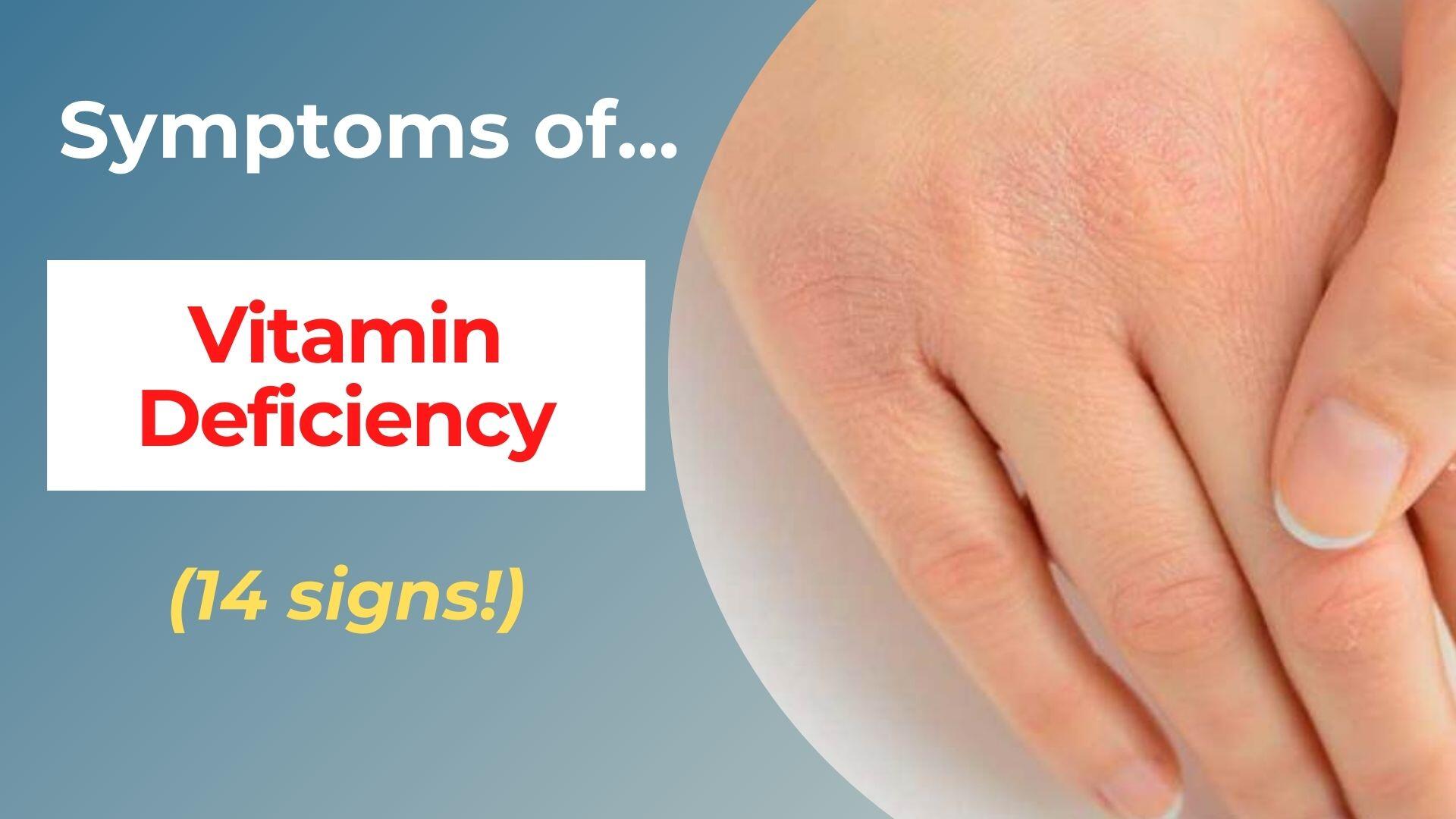It’s important to know the symptoms of vitamin and mineral deficiency because it is a common problem in today’s world.
A nutrition report from the CDC suggests 10% of Americans are deficient in at least one nutrient. If you live elsewhere, levels of nutrient deficiency are higher than 40% (see resources below).
Vitamin and mineral deficiencies can lead to a dizzying array of symptoms.
This blog post will discuss the top 14 of these symptoms!
1 – Tingling fingers or feet

The technical term for “tingling fingers” is paresthesia.
Paresthesia is where you feel a sensation of pins and needles or numbness, usually in your hands and feet.
Other similar symptoms include:
- skin crawling
- itching
- your fingers or toes “fell asleep”
The symptoms are often worse at night when you’re trying to sleep! They can be caused by many conditions such as:
- Stroke and/or mini-stroke
- Diabetes mellitus
- Kidney failure
- Lyme disease
- Vitamin deficiency
As this article focuses on vitamin and mineral deficiencies, the deficiencies that may also cause paresthesia:.
- Calcium deficiency
- Vitamin B12
- Magnesium deficiency
- Vitamin B5
- Vitamin E
Paresthesia is very common among older people so it’s important for seniors’ caregivers to know the symptoms.
If left untreated, paresthesia could lead to serious health problems like heart attack and stroke.
Treating an underlying vitamin deficiency may help reduce symptoms but please talk with your physician if you have any concerns about your symptoms worsening over time.
2 – Abnormal heart rate

The technical term for an abnormal heart rate is “atrial fibrillation”.
Atrial fibrillation is a heart rhythm disorder where the heart’s two upper chambers (atria) beat irregularly and out of sync with the two lower chambers (ventricles).
This can cause symptoms like:
- heart palpitations
- shortness of breath
- chest pain
- dizziness
- fainting
- weakness
Left untreated, atrial fibrillation can lead to stroke, heart failure and other heart-related complications.
Atrial fibrillation symptoms vary from person to person. You may not experience all of the symptoms listed here so it’s important to be aware of what to look for.
Causes of atrial fibrillation include:
- congestive heart failure
- kidney disease
- high blood pressure (hypertension)
- diabetes mellitus
- vitamin or mineral deficiency
What are the vitamin and mineral deficiencies that cause atrial fibrillation?
- Vitamin D
- Magnesium
- Potassium
- Vitamin B12
3 – Fatigue

Fatigue is a feeling of tiredness that can be mild or extreme.
It’s one of the most common symptoms of vitamin or mineral deficiency and can have many other causes:
- lack of sleep
- poor diet
- stress
- illness
- medication side effects
- excessive exercise
- vitamin or mineral deficiency
In terms of vitamin or mineral deficiency, it’s difficult to create a short list because any deficiency may lead to a feeling of fatigue.
The most likely vitamin and mineral deficiency culprits leading to fatigue:
- Vitamin D
- Vitamin B-12+
- Iron
- Magnesium
- Potassium
4 – Getting sick more easily

If you find yourself getting sick more easily then you may have a vitamin deficiency.
In severe cases of deficiency, you can totally compromise your immune system and die!
Of course, there are many potential causes of getting sick more frequently, including:
- Less sleep
- More stress
- Poor diet
- Exposure to pollutants
- Vitamin deficiency
In terms of vitamin deficiency specifically, the most likely culprit by far is a lack of Vitamin C!
5 – Impaired mental and physical development

Impaired development caused by vitamin and mineral deficiencies are common in less developed parts of the world.
In developing countries, there are major public health problems which impact over 2 billion people.
A lack of vitamins and minerals relates directly to many problems such as:
- retardation of physical and mental growth
- blindness
- muscle weakness
- mental confusion
What are the primary vitamin and mineral deficiencies causing these problems?
- Vitamin A
- Zinc
- Iodine
- Iron
6 – Weaker bones
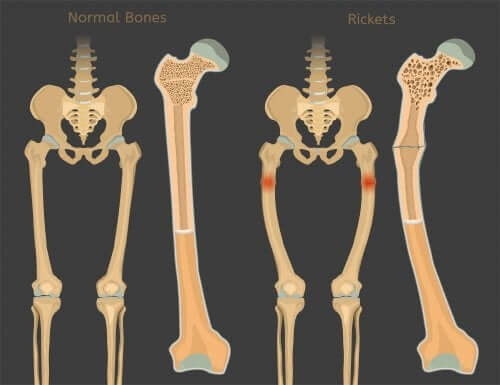
The most obvious example of weak bones caused by vitamin and mineral deficiency is rickets.
Rickets is where the bones become soft and weak because they’re not getting enough calcium and vitamin D.
This can lead to problems like:
- bowed legs
- poor posture
- abnormal curvature of the spine (scoliosis)
- bone pain
- soft bones
However, a lack of calcium can also cause adults to have weak bones in later life, resulting in:
- broken hip
- fractured bones
- brittle nails
While calcium is the obvious mineral deficiency, there are several vitamins which support calcium absorption such as:
- Vitamin D deficiency
- Vitamin K
- Magnesium
Vitamin D deficiency is important to look at because Vitamin D helps your body absorb calcium.
For this reason many women who are worried about osteoporosis take a vitamin D supplement.
Of course, you can also just eat iron-rich foods, which will lead to better health conditions (instead of just relying on a supplement for health bones)
7 – Hair loss

Is your hair becoming thin or brittle, or are you experiencing patchy hair loss?
Hair loss can be caused by many factors but vitamin or mineral deficiency is one of them.
In fact, a lack of certain vitamins can lead to hair loss all over the body including:
- the head
- eyebrows
- eyelashes
- facial hair
Vitamins are essential for healthy skin, nails and hair. That’s why symptoms of vitamin deficiencies can include changes in the appearance of your hair, skin and nails.
If you are looking to minimize deficiencies in your skin, Best Spray Tan OKC can help you in getting necessary vitamins.
The most common vitamin and mineral deficiencies responsible for hair loss, in particular:
- Iron
- Vitamin D
8 – Eye twitch
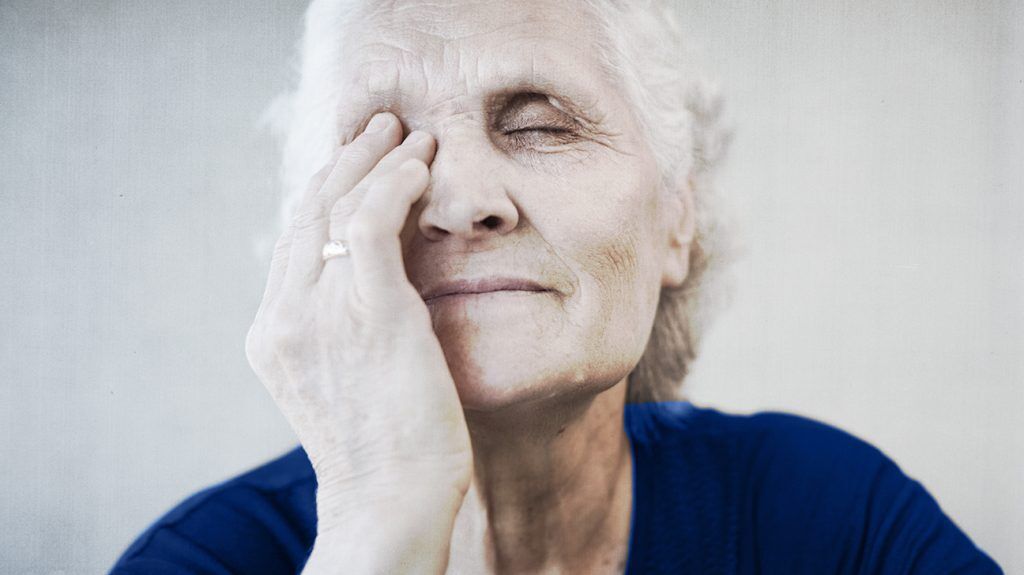
Eye twitching is a very common symptom of vitamin deficiency.
In fact, it’s a symptom that often goes undiagnosed as the sufferer assumes that it’s just a random occurrence.
The twitch may be in one eye or both and can last from a few seconds to several hours.
It’s usually not painful but there can be some symptoms that accompany the twitch including:
- pain in or around your eye
- a feeling of irritability
- tiredness
All of these can be symptoms of a vitamin deficiency.
The most common vitamin and mineral deficiencies associated with eye twitching are:
- Vitamin B-12
- Calcium
- Folic acid
9 – Heel cracks
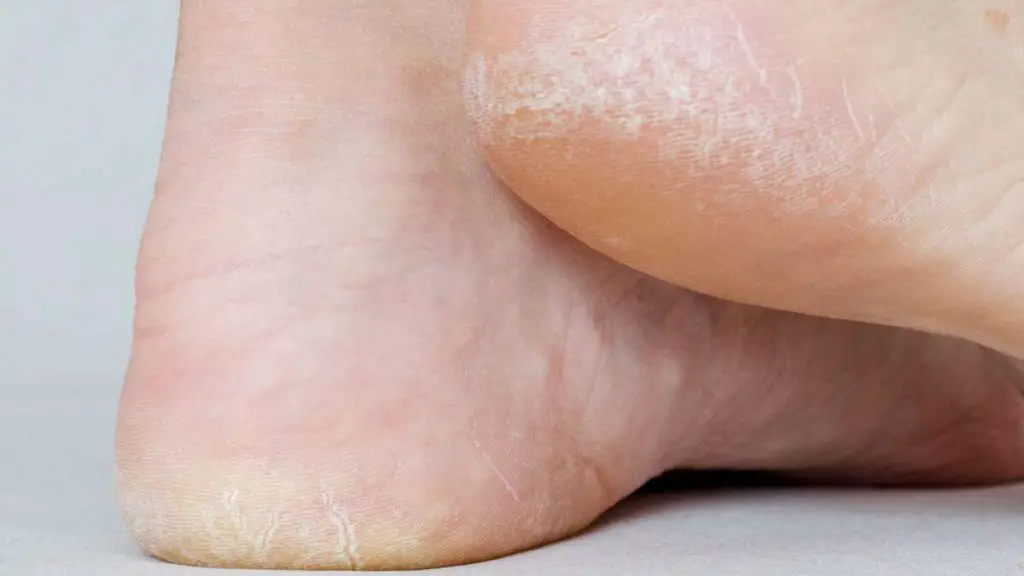
Heel cracks are symptoms of vitamin or mineral deficiency, along with lack of moisture .
They’re very common symptoms particularly in older people, but can also affect younger sufferers too.
The symptoms include:
- painful cracking or flaking skin around the heels and balls of your feet
- dryness to the point of itchiness
- increased dryness and scaling in between toes
Heel cracks can be symptoms of a vitamin or mineral deficiency because:
- Vitamin D helps your body absorb calcium, which strengthens bones.
- Vitamin C is needed for the formation of collagen. Collagen keeps skin strong and elastic; it also supports connective tissue that holds cells together.
- Iron helps carry oxygen to your cells so that they can function normally and keep the skin healthy by producing collagen for strong, elastic tissue.
- Vitamin A plays an important role in skin health because it is needed for sebum production which keeps the skin soft and pliable.
There are some symptoms of vitamin deficiencies that aren’t as obvious as others.
For example, symptoms of vitamin deficiency can include stomach pain and cramps which are often attributed to other causes. Same with heel cracks!
You could easily just be chronically dehydrated.
However, having a lack of vitamins in your diet can also cause this type of discomfort so it’s worth checking with your doctor if you think you might have symptoms related to your diet or lifestyle.
10 – Muscle cramps
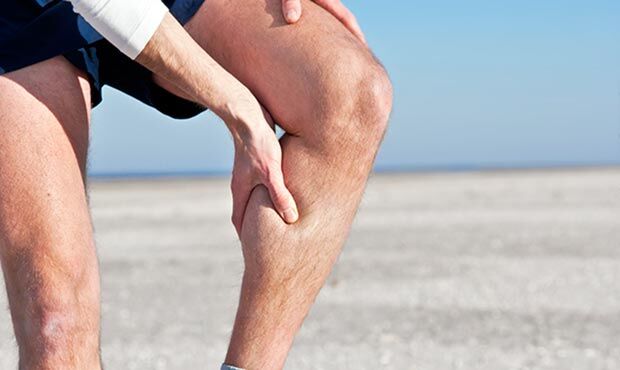
Even for the most physically active people, symptoms of mineral deficiency can include muscle cramps.
The symptoms are caused by a sudden tightening or spasm in your muscles that leaves them feeling sore and tender to touch.
Muscle cramps can include:
- leg cramps
- foot cramps
- menstruation cramps
Muscle cramps are most often because of potassium deficiency.
Your muscles need potassium because it helps them contract and relax.
However, other mineral deficiencies that cause muscle cramps can include:
- calcium deficiency
- magnesium deficiency
11 – Chapped lips
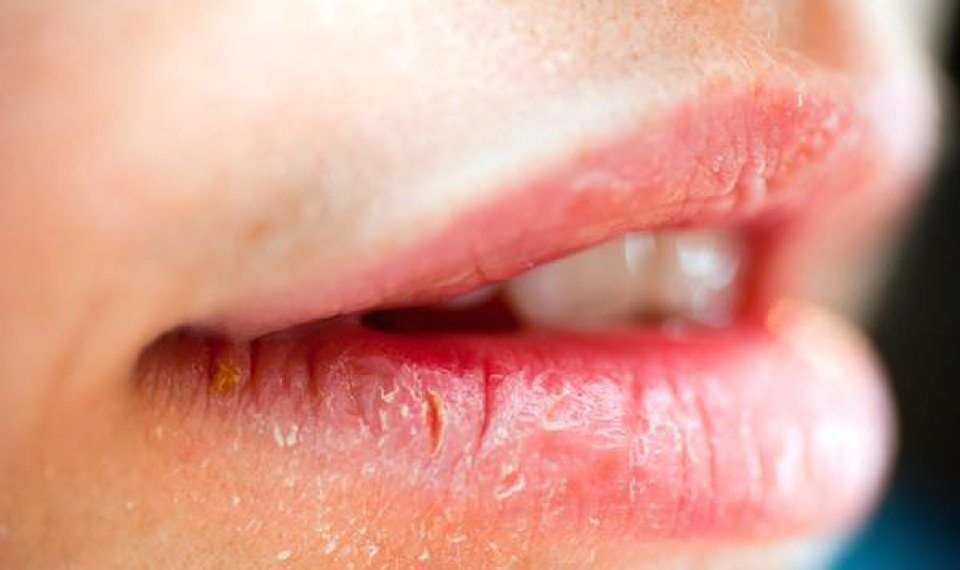
Chapped lips typically occur as a result of sun exposure, but they also can be related to vitamin or mineral deficiencies.
Lips become chapped when they’re exposed to the ultraviolet light in sunlight or artificial UV rays from tanning beds.
The symptoms include:
- dry, scaly skin on your lips that can be very painful and itchy
- cracked, red or white skin that bleeds easily
Vitamin and mineral deficiencies symptoms linked to chapped lips include:
- vitamin A deficiency which can cause dryness and scaling of the outermost layer of your lips (epidermis)
- zinc deficiency symptoms including scaly plaques on your upper lip
12 – Bruising easily
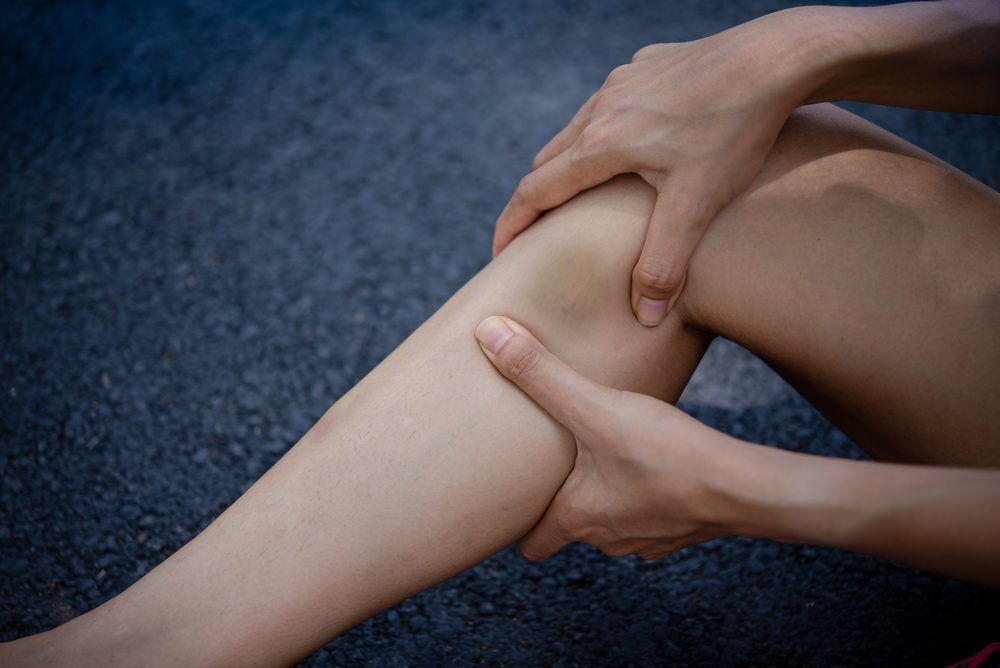
Bruising easily is a symptom of vitamin deficiency that can have many other different causes.
Bruising can be caused by everything from a minor injury to a more serious underlying health condition.
Just because you bruise, that does not mean you have a vitamin deficiency.
However, vitamin deficiency can definitely lead to bruising easily.
Some common symptoms of bruising easily include:
- easy bruising on your skin, including fingers, toes and the palms of your hand
- large or raised bruises that are darker in color
Bruising easily can be caused by vitamin deficiencies:
- Vitamin K, which is needed for your blood to clot normally.
- Vitamin C, lack of which can result in slow wound healing, which leads to easy bruising and bleeding.
13 – Peeling skin
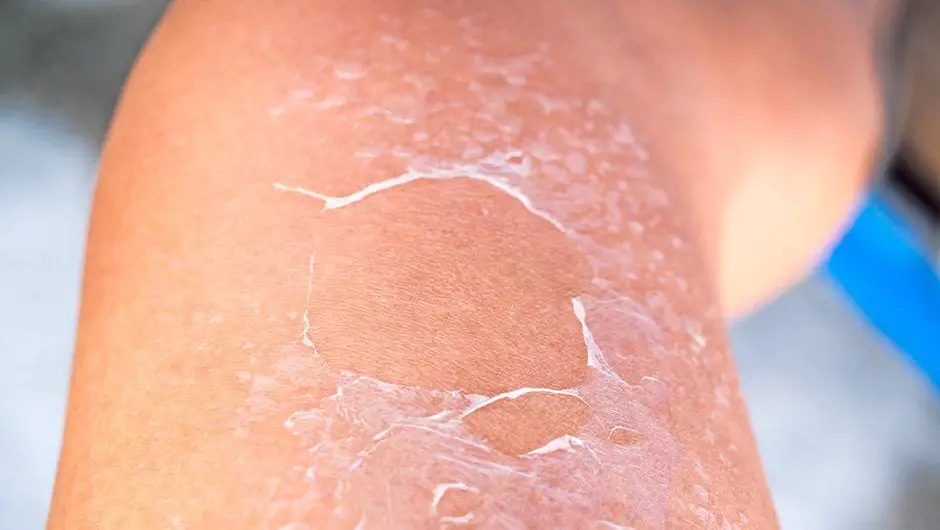
Peeling skin symptoms can be a result of many different things, from dryness to eczema.
However symptoms of peeling skin that are related to vitamin or mineral deficiency include:
- dry or flaky patches on your face and body
- cracking along the edges of your lips; corners of your mouth may feel sore when you eat or drink
- skin that is unusually pale, especially on your face and hands
These symptoms can be caused by a lack of:
- vitamin A, which helps form the protective outer layer of skin (epidermis)
- zinc, which helps to heal wounds and keep skin healthy
14 – White spot on nail
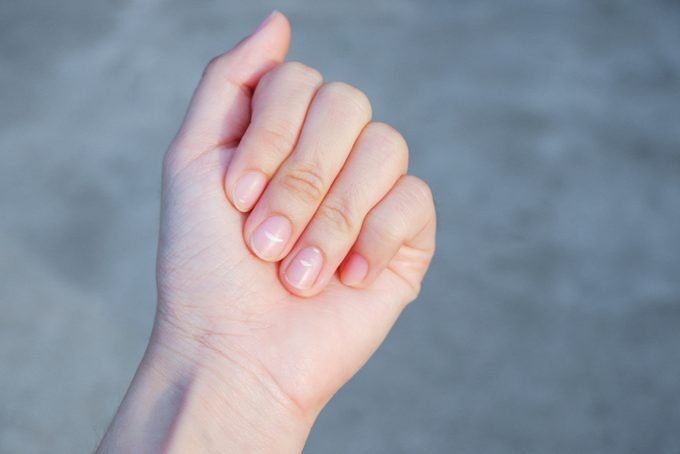
A white spot on your nail is a common symptom of mineral or vitamin deficiency.
The white spots are usually caused by a lack of calcium in your diet, as well as Vitamin D.
Other symptoms of calcium deficiency can include:
- weak bones and teeth
- osteoporosis
- rickets in children
- poor growth in both adults and children
However, symptoms related to other types of vitamin deficiencies that can cause white spots include:
- riboflavin (vitamin B-complex) deficiency symptoms which includes ridges and dents in the surface of your nails
- vitamin C deficiency symptoms which includes white spots, patches or lines on your nails
- folic acid (B-complex vitamin) symptoms that include a single dark line in the middle of one of your nails
What is the most common deficiency?
Iron deficiency is the most common deficiency world and affects over 25% of people worldwide.
Iron deficiency causes the red blood cells to become inefficient oxygen carriers, leading to increased risk for negative health outcomes like fatigue.
For more on this, see the same CDC report (see Resources below).
How do you know if you have a deficiency (and not something else)?
Many symptoms of deficiency mirror other causes.
For example with bruising you may be deficient in Vitamin K, but you may have just walked into a door!
The cheapest way to check if you have a deficiency is to eat foods which contain the vitamin or mineral in question and see if your deficiency goes away!
Another cheap option is to take one of the many dietary supplements available.
If you aren’t sure what deficiency you have then ordering a blood test will give you precise answers.
There are home kits available.
What happens when your body is low on vitamins and minerals?
When your body is low on vitamins or minerals you can see symptoms in many different ways.
Some symptoms are specific to one deficiency, while others are more general.
For example, a lack of Vitamin C can lead to slow wound healing and easy bruising, while a lack of iron can lead to fatigue and weakness.
However, some symptoms are common to all deficiencies including:
- muscle weakness and fatigue
- problems with your skin, hair, or nails
- poor appetite
- problems with your digestion
- a feeling of being unwell
What can you do to prevent vitamin and mineral deficiencies?
There are many things you can do to help prevent vitamin deficiencies, including:
- eating a balanced and healthy diet that includes plenty of fresh fruits and vegetables
- taking a multivitamin supplement daily
- making sure you don’t smoke or drink alcohol excessively
- eating oily fish regularly for your omega-three fatty acids.
Avoiding deficiencies is something that will impact both the quality and length of your life!
What if my eating is out of control even though I eat a balanced diet?
If you’re struggling with emotional eating and have a balanced diet, it’s less likely that you have a vitamin or mineral deficiency.
Emotional eating is different from a food craving caused by vitamin or mineral deficiencies.
If you are suffering from binge or emotional eating, there are practical solutions available to you.
Be sure to read more about binging disorders and science based solutions!
Conclusion
Vitamin and mineral deficiencies affect many people and have many different symptoms.
Eating a diet rich in vitamins and necessary minerals often will help get rid of these symptoms, but there are also supplements available depending on the missing nutrient that could give more immediate results.


